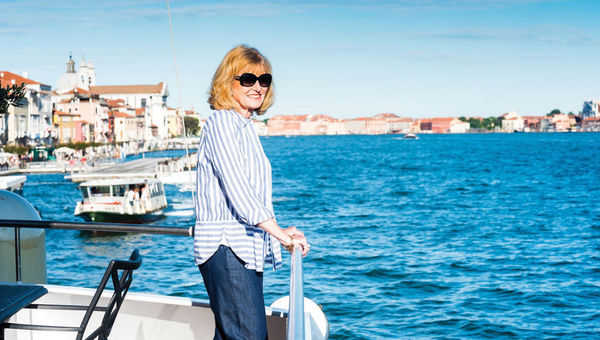Riviera River Cruises’ decision to double down on departures exclusively for solo passengers is the latest example of travel companies catering to parties of one.
Research shows solo travel is one of the fastest-growing travel markets, and river cruise brands, like their ocean counterparts and tour companies, are seeing increased demand for the option.
Riviera in particular is making a big investment in the demographic, adding three itineraries to its solo traveler cruise program that does away with single-supplement fees. Such fees have historically been a hurdle for solo travelers, especially cruisers. The line will have more than 40 solo traveler departures in 2024 and 2025, its largest such offering to date.
“We first tried this concept about five years ago with just a few departures, and now, as you can see, it’s become part of our overall product,” said Marilyn Conroy, Riviera’s executive vice president of sales and marketing for North America. “We realize this is an important and growing segment of the marketplace, and we want to be on the cutting edge of it.”
Riviera is not the only river line seeing a significant increase in interest from people traveling on their own.
Uniworld Boutique River Cruises CEO Ellen Bettridge said Uniworld “saw a sharp increase in solo travelers in 2023 compared to 2019 … a 31% total increase, with a 61% increase in female travelers.”

Avalon Waterways said it has been seeing a “steady rise” in solo travel in river cruising. According to a recent “wish list” survey of 16,600 past guests, 13% of respondents said they’re planning to go solo on their next cruise, said Steve Born, chief marketing officer for the Globus family of brands, Avalon’s parent company.
Solo numbers hold steady
Solo travelers make up approximately 11% of Uniworld’s bookings and about 10% of Avalon’s current guests, which Born said is a number that hasn’t changed dramatically since the pandemic. Tauck said that solo travelers are an important market for the company but one that hasn’t grown much over the years.
One reason those percentages aren’t rising for many lines is the financial difficulty in setting aside space for lone travelers: Ships are built with the expectation that two paying passengers will fill each cabin.
Uniworld said it once considered launching solo-only itineraries but that the operational costs of a cruise with 50% capacity would increase the price for consumers beyond what it is comfortable charging.
Riviera said its solo-only cruises are financially feasible in part because its ships can make adjustments that compensate for the anticipated drop in ticket revenue.
“When you have two people in a cabin, you have twice the food and beverage charges as you do for one,” Conroy said. “When we price our cruises for the year, we factor in a certain amount of solo departures, mostly during the soft season.”
And with so many river cruises available, Conroy added, “We felt we should factor in these departures in order to differentiate our product from the rest and gain entry into the huge and growing singles market.”
Other lines will cater to the market by adjusting or waiving their single-supplement fees on an occasional or by-category basis.

Tauck waives the single supplement on every Category 1 cabin for every itinerary in its portfolio. Avalon Waterways waives the fee on a select number of cabins and suites on every departure in Europe and Southeast Asia. Uniworld, AmaWaterways and Viking offer promotional savings events and discounts on the fees throughout the year. Amadeus River Cruises said it offers a fixed 15% single supplement in its Category C cabins on the lower levels of its ships.
But travel advisors say these limitations narrow the overall options for their single clients and keeps them busy trying to find the best prices and itineraries.
“Sometimes pricing can be a barrier to attracting more solos,” said Margo McDonough, owner of Blue Skies Travel Center in Landenberg, Pa., who has a strong solo-traveler base among her clientele.
“I think the industry can be shortsighted in focusing on immediate profits garnered from double-occupancy staterooms rather than the long-term growth potential in being solo-traveler friendly,” she said. “Almost all of my solo travelers are women who have the means and desire to travel frequently.”
And, McDonough said, referring to cruise lines that restrict the number of solos they allow her to book in groups, “I hate having to turn solos away when I run out of single spots.”
